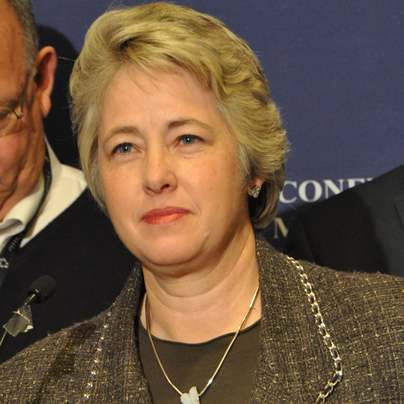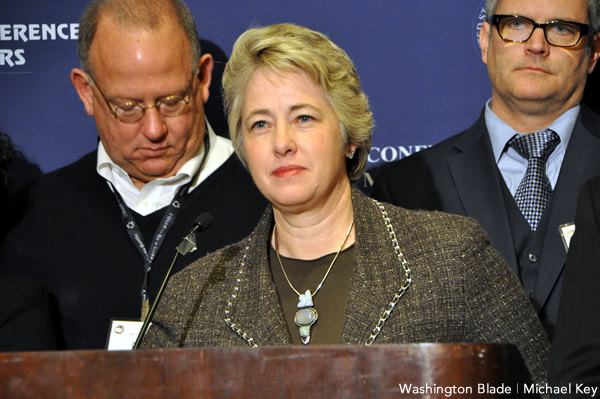National
Gay mayoral candidates win in Houston, Seattle
Dozens of LGBT candidates win in state and local races throughout country


Annise Parker cruised to a re-election victory, winning more than 50 percent of the vote and thus avoiding a runoff. (Washington Blade file photo by Michael Key)
Lesbian Annise Parker won a decisive victory in her race for a third and final term as mayor of Houston, Tex., on Tuesday, receiving 57 percent of the vote in a nine-candidate race.
In Seattle, Washington State Sen. Ed Murray beat incumbent Mayor Mike McGinn by a margin of 56 percent to 43 percent to become that city’s first openly gay mayor.
Miami Beach City Commissioner and mayoral candidate Michael Gongora, who’s gay, was trailing businessman Philip Levine by a 50.48 percent to 36.43 percent margin in a four-candidate race. With votes counted in all 36 precincts, Gongora’s bid to become the city’s first openly gay mayor was hanging by a thread.
Under Miami-Dade County election rules, Gongora and Levine would compete in a runoff election next month if Levine fails to capture at least 50.5 percent of the vote. The Miami Herald reported that a recount was expected to be called to determine whether Levine, who contributed more than $1.5 million of his own money into his campaign, could squeak out a victory without a runoff.
Parker and Murray, meanwhile, were among 53 openly gay, lesbian, or bisexual candidates to win election in state, county, and municipal races on Nov. 5 and in several general election races held earlier in the year, according to the Gay and Lesbian Victory Fund, a national LGBT advocacy group that raises money for LGBT candidates.
All had been endorsed by the Victory Fund.
“We’re extremely proud of all of our candidates,” said Victory Fund President and CEO Chuck Wolfe. “Tonight’s victories across the country and at all levels of government underscore the power of people fighting for fairness, progress, and LGBT equality,” he said.
The 53 endorsed candidates to emerge as winners this year were among a record 85 openly LGBT candidates endorsed by the Victory Fund in the so-called off-year election in 2013, the Victory Fund said in a statement.
Twenty-five of the openly LGBT Victory Fund endorsed candidates lost their races. Three races on Tuesday involving openly gay candidates were too close to call as of early Wednesday, and three of Tuesday’s races involving gay or lesbian candidates were heading for runoff elections in December. Two Victory Fund endorsed candidates withdrew from their races during the campaign.
Victory Fund spokesperson Jeff Spitko said the group’s win rate as of early Wednesday was 61 percent.
Spitko said that of the 54 gay, lesbian, or bisexual candidates endorsed by the Victory Fund who appeared on the ballot on Tuesday, 35 won, 11 lost, three were in races too close to call as of Wednesday morning, and three advanced to run-off elections in December.
At least one openly gay mayoral candidate who was not endorsed by the Victory Fund – Republican Don Guardian of Atlantic City, N.J., — won his race on Tuesday, defeating incumbent Mayor Lorenzo Langford, a Democrat, by a vote of 3,066 to 2,904, according to the Atlantic City Press. Guardian becomes Atlantic City’s first openly gay mayor.*
In the D.C. area, gay attorney Patrick Wojahn won re-election to the College Park, Md., City Council on Tuesday. Wojahn finished second in a race where three candidates competed for two seats in the Council’s District 1.
In College Park’s District 2, gay federal government worker P.J. Brennan won his race unopposed for one of the two seats in that district.
Jim Ireton, the openly gay mayor of Salisbury, Md., the largest city in Maryland’s Eastern Shore region, was among the Victory Fund endorsed candidates to win election earlier in the year. Ireton won his race for a second term as Salisbury’s first out gay mayor by a two-two-one margin back in April.
In other contests that the Victory Fund placed on a list of ten important races to watch, lesbian Celia Israel of Austin, Tex., advanced to a December run-off in her bid for a seat in the Texas House of Representatives. If she wins the run-off she would become the second out member of the Texas House.
Also advancing to a run-off is Catherine LaFond, a candidate for the Charleston, S.C., Water System Commission. If she wins in the run-off, she would become South Carolina’s first and only out LGBT elected official.
In New York City, six of the seven openly gay or lesbian candidates for the City Council won their races on Tuesday. All were Democrats running in solid Democratic districts.
Although the mayoral contest in Houston centered mostly on non-LGBT issues, Parker’s main opponent, millionaire attorney Ben Hall, raised concern among LGBT activists when he expressed opposition to same-sex marriage and said he would not push for legislation to ban discrimination against LGBT people.
Some political observers thought Hall had a shot at forcing Parker into a run-off election in December if he and some of the other candidates in the race prevented Parker from receiving at least 50 percent of the vote needed to win the election outright.
But Hall received 28 percent of the vote and all of the remaining candidates received a combined vote of just 15 percent.
Parker’ supporters said city residents got to know and like Parker since she served on the City Council in an at-large seat from 1998 to 2003 and served as city controller from 2004 to 2010. She won election to her first two-year term as mayor in 2010.
“I love this city,” Parker said in her victory speech Tuesday night. “Tonight, I feel like it loves me back, so thank you for the very warm welcome…Thank you to the many people who made this victory possible.”
A list of the LGBT candidates that won and lost their races throughout the country can be seen here: http://www.gaypolitics.com/
New York
Two teens shot steps from Stonewall Inn after NYC Pride parade
One of the victims remains in critical condition

On Sunday night, following the annual NYC Pride March, two girls were shot in Sheridan Square, feet away from the historic Stonewall Inn.
According to an NYPD report, the two girls, aged 16 and 17, were shot around 10:15 p.m. as Pride festivities began to wind down. The 16-year-old was struck in the head and, according to police sources, is said to be in critical condition, while the 17-year-old was said to be in stable condition.
The Washington Blade confirmed with the NYPD the details from the police reports and learned no arrests had been made as of noon Monday.
The shooting took place in the Greenwich Village neighborhood of Manhattan, mere feet away from the most famous gay bar in the city — if not the world — the Stonewall Inn. Earlier that day, hundreds of thousands of people marched down Christopher Street to celebrate 55 years of LGBTQ people standing up for their rights.
In June 1969, after police raided the Stonewall Inn, members of the LGBTQ community pushed back, sparking what became known as the Stonewall riots. Over the course of two days, LGBTQ New Yorkers protested the discriminatory policing of queer spaces across the city and mobilized to speak out — and throw bottles if need be — at officers attempting to suppress their existence.
The following year, LGBTQ people returned to the Stonewall Inn and marched through the same streets where queer New Yorkers had been arrested, marking the first “Gay Pride March” in history and declaring that LGBTQ people were not going anywhere.
New York State Assemblywoman Deborah Glick, whose district includes Greenwich Village, took to social media to comment on the shooting.
“After decades of peaceful Pride celebrations — this year gun fire and two people shot near the Stonewall Inn is a reminder that gun violence is everywhere,” the lesbian lawmaker said on X. “Guns are a problem despite the NRA BS.”
New York
Zohran Mamdani participates in NYC Pride parade
Mayoral candidate has detailed LGBTQ rights platform

Zohran Mamdani, the candidate for mayor of New York City who pulled a surprise victory in the primary contest last week, walked in the city’s Pride parade on Sunday.
The Democratic Socialist and New York State Assembly member published photos on social media with New York Attorney General Letitia James, telling followers it was “a joy to march in NYC Pride with the people’s champ” and to “see so many friends on this gorgeous day.”
“Happy Pride NYC,” he wrote, adding a rainbow emoji.
Mamdani’s platform includes a detailed plan for LGBTQ people who “across the United States are facing an increasingly hostile political environment.”
His campaign website explains: “New York City must be a refuge for LGBTQIA+ people, but private institutions in our own city have already started capitulating to Trump’s assault on trans rights.
“Meanwhile, the cost of living crisis confronting working class people across the city hits the LGBTQIA+ community particularly hard, with higher rates of unemployment and homelessness than the rest of the city.”
“The Mamdani administration will protect LGBTQIA+ New Yorkers by expanding and protecting gender-affirming care citywide, making NYC an LGBTQIA+ sanctuary city, and creating the Office of LGBTQIA+ Affairs.”
U.S. Supreme Court
Supreme Court upholds ACA rule that makes PrEP, other preventative care free
Liberal justices joined three conservatives in majority opinion

The U.S. Supreme Court on Friday upheld a portion of the Affordable Care Act requiring private health insurers to cover the cost of preventative care including PrEP, which significantly reduces the risk of transmitting HIV.
Conservative Justice Brett Kavanaugh authored the majority opinion in the case, Kennedy v. Braidwood Management. He was joined by two conservatives, Chief Justice John Roberts and Justice Amy Coney Barrett, along with the three liberal justices, Sonia Sotomayor, Elena Kagan, and Ketanji Brown-Jackson.
The court’s decision rejected the plaintiffs’ challenge to the Affordable Care Act’s reliance on the U.S. Preventative Services Task Force to “unilaterally” determine which types of care and services must be covered by payors without cost-sharing.
An independent all-volunteer panel of nationally recognized experts in prevention and primary care, the 16 task force members are selected by the secretary of the U.S. Department of Health and Human Services to serve four-year terms.
They are responsible for evaluating the efficacy of counseling, screenings for diseases like cancer and diabetes, and preventative medicines — like Truvada for PrEP, drugs to reduce heart disease and strokes, and eye ointment for newborns to prevent infections.
Parties bringing the challenge objected especially to the mandatory coverage of PrEP, with some arguing the drugs would “encourage and facilitate homosexual behavior” against their religious beliefs.
-

 U.S. Supreme Court4 days ago
U.S. Supreme Court4 days agoSupreme Court upholds ACA rule that makes PrEP, other preventative care free
-

 U.S. Supreme Court4 days ago
U.S. Supreme Court4 days agoSupreme Court rules parents must have option to opt children out of LGBTQ-specific lessons
-

 National5 days ago
National5 days agoEvan Wolfson on the 10-year legacy of marriage equality
-

 Congress4 days ago
Congress4 days agoSenate parliamentarian orders removal of gender-affirming care ban from GOP reconciliation bill











